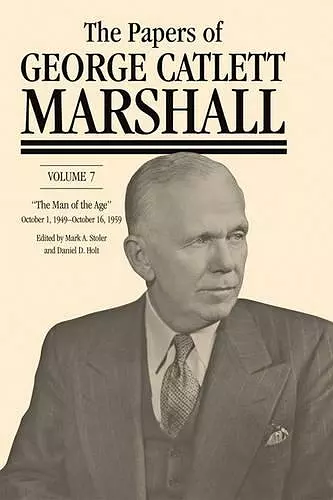The Papers of George Catlett Marshall
"The Finest Soldier," January 1, 1945–January 7, 1947
George Catlett Marshall author Larry I Bland editor Sharon Ritenour Stevens editor
Format:Hardback
Publisher:Johns Hopkins University Press
Published:5th Jan '04
Currently unavailable, and unfortunately no date known when it will be back

The two years covered in the fifth volume of The Papers of George Catlett Marshall were among the most momentous in the life of Army Chief of Staff George C. Marshall-and in the course of the twentieth century. A year of transitions for Marshall, 1945 witnessed the final assault on Nazi Germany and the use of atomic weapons against Japan. Allied forces under the command of Marshall's protege, Dwight D. Eisenhower, had contained Hitler's Ardennes offensive at the beginning of the year and launched the final drive to smash the German regime. The war against Japan seemed far from over, however, and Marshall was deeply involved in planning for the massive and difficult redeployment of troops and materials from Europe to the Pacific. The debate with the U.S. Navy over supreme command of the invasion of Japan continued through the first six months of the year until Marshall secured Douglas A. MacArthur's appointment. In May and June, the chief of staff was involved in the decision to use the new atom bomb. Military-related political problems continued to consume much of Marshall's time as the Second World War drew to a close, although he was only peripherally involved in the Big Three conferences at Yalta and Potsdam. Instead, demobilization and readying U.S. Army ground and air forces for the postwar era were Marshall's chief concerns. He pressed for a unified military department against navy opposition and also lobbied incessantly for universal military training for all physically fit eighteen-year-old males as the key element in the nation's military readiness and deterrent value. After the fighting ceased, Marshall expected to retire, having served on active duty since 1902, but President Truman kept him in office until late November 1945. The day after his retirement, the president asked him to go to China to mediate in that country's increasingly violent civil war. Despite his initial success in negotiating a cease-fire between the Nationalists and Communists, irreconcilable differences soon led to renewed fighting. Marshall's continued hopes for achieving a political compromise, along with knowledge that his mission was the only hope for avoiding a disaster in China, kept him in the country until early 1947. He returned to the United States only when the president announced that General Marshall would...
Volume 5 of the Marshall Papers possesses the same laudable features as its predecessors: selections from a variety of sources; meticulous attention to detail; and numerous helpful aids, including a chronology and excellent illustrations. -- Alan F. Wilt Journal of Military History 2005
ISBN: 9780801878718
Dimensions: 229mm x 152mm x 51mm
Weight: 1383g
856 pages